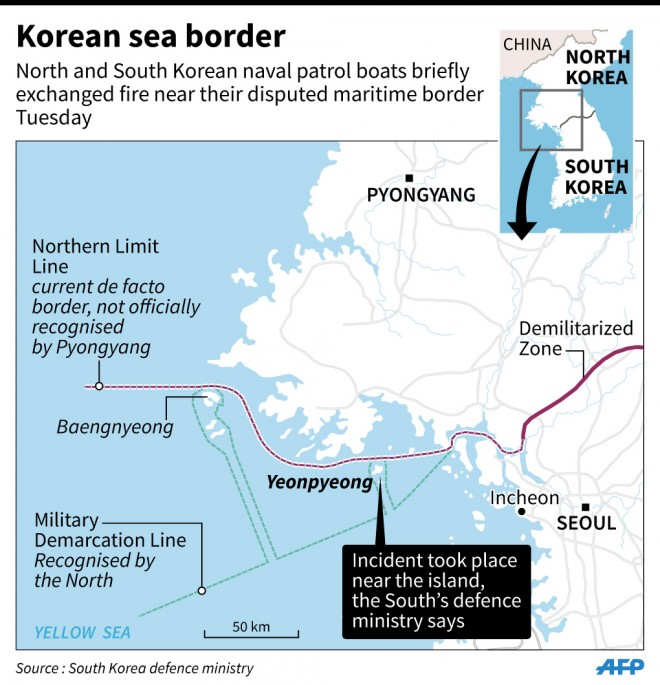SEOUL–North and South Korean naval patrol boats briefly exchanged warning fire Tuesday near their disputed Yellow Sea border which has been the site of numerous clashes in the past, the South’s defense ministry said.
The incident came as hopes had been raised of a constructive reboot in strained inter-Korean relations following the surprise visit of a top-ranking North Korean delegation to the South just three days before.
The defense ministry said the South’s patrol boat had initially fired a warning shot after the North Korean vessel penetrated half a nautical mile inside the South’s territorial waters.
Instead of retreating immediately, the North patrol boat opened fire, so “our side fired back,” a ministry spokesman said, adding that there neither vessel had directly targetted the other and “no damage” was sustained.
The South’s patrol boat fired “around 90” rounds in total.
The incident took place at 9:50 a.m. (0050 GMT) near the South Korean border island of Yeonpyeong, and the North patrol boat retreated to its side of the border 10 minutes later.
“We are now watching North Korean troop movements and tightening vigilance against any additional provocations,” the spokesman said.
The de-facto maritime boundary between the two Koreas — the Northern Limit Line — is not recognized by Pyongyang, which argues it was unilaterally drawn by US-led United Nations forces after the 1950-53 Korean War.
The Korean conflict ended in an armistice instead of a peace treaty, and technically the two Koreas are still at war.
Both sides complain of frequent maritime incursions by the other and there were limited naval clashes in 1999, 2002 and 2009.
In November 2010, North Korea shelled Yeonpyeong island, killing four South Koreans and briefly triggering concerns of a full-scale conflict.
The latest scrap followed the shock visit to South Korea on Saturday by some of North Korean leader Kim Jong-Un’s closest aides.
It was led by Hwang Pyong-So, a newly elected vice chairman of the nuclear-armed North’s powerful National Defense Commission who is widely seen as Kim Jong-Un’s number two.
The visit resulted in an agreement to resume a high-level dialogue that had been suspended for seven months as military tensions on the divided peninsula soared.
The delegation also delivered the message that Kim Jong-Un had no serious health problem, despite not being seen in public for more than a month.
